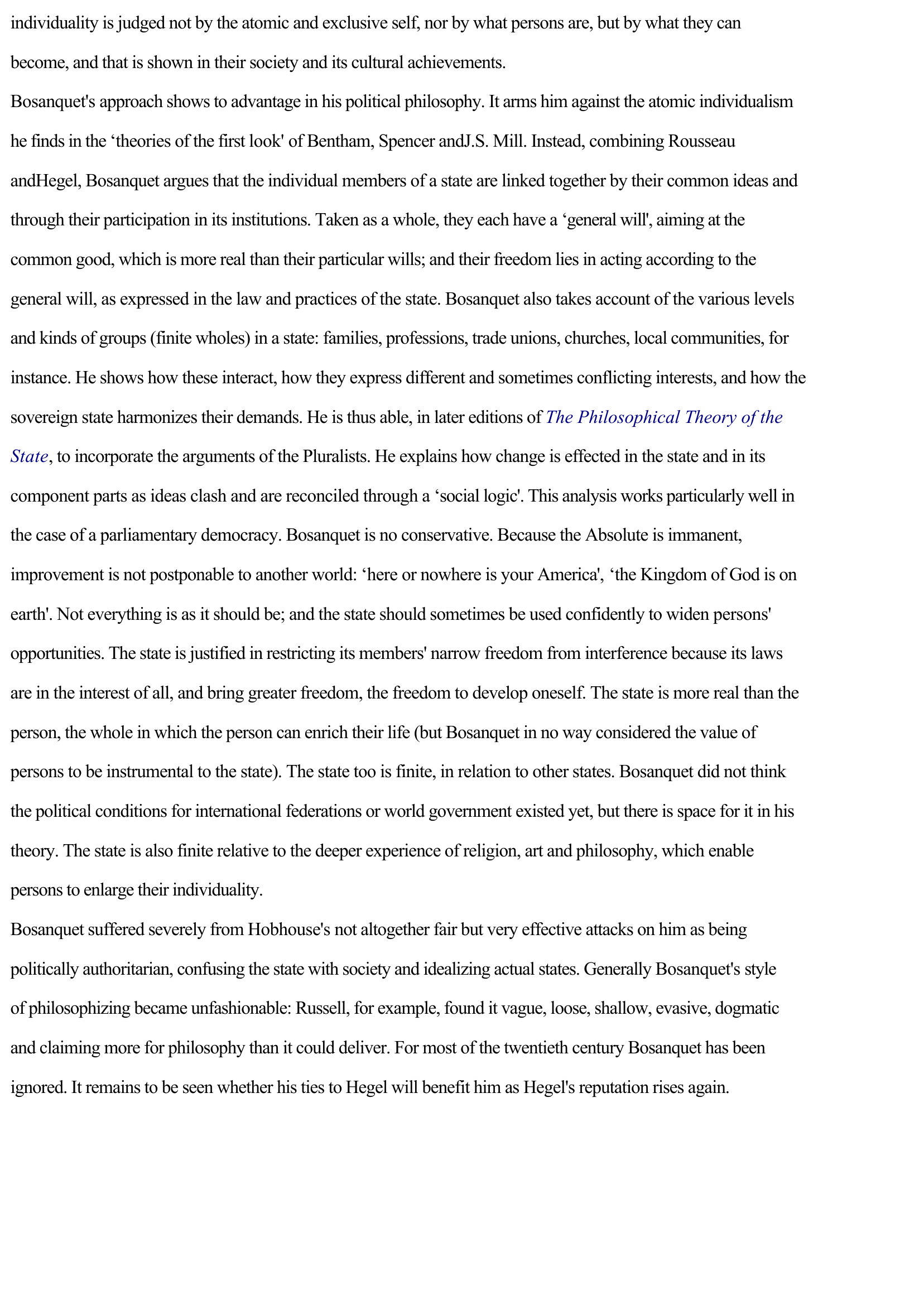Bosanquet, Bernard
Publié le 22/02/2012

Extrait du document
«
individuality is judged not by the atomic and exclusive self, nor by what persons are, but by what they can
become, and that is shown in their society and its cultural achievements.
Bosanquet's approach shows to advantage in his political philosophy.
It arms him against the atomic individualism
he finds in the ‘theories of the first look' of Bentham, Spencer andJ.S.
Mill.
Instead, combining Rousseau
andHegel, Bosanquet argues that the individual members of a state are linked together by their common ideas and
through their participation in its institutions.
Taken as a whole, they each have a ‘general will' , aiming at the
common good, which is more real than their particular wills; and their freedom lies in acting according to the
general will, as expressed in the law and practices of the state.
Bosanquet also takes account of the various levels
and kinds of groups (finite wholes) in a state: families, professions, trade unions, churches, local communities, for
instance.
He shows how these interact, how they express different and sometimes conflicting interests, and how the
sovereign state harmonizes their demands.
He is thus able, in later editions of The Philosophical Theory of the
State , to incorporate the arguments of the Pluralists.
He explains how change is effected in the state and in its
component parts as ideas clash and are reconciled through a ‘social logic' .
This analysis works particularly well in
the case of a parliamentary democracy.
Bosanquet is no conservative.
Because the Absolute is immanent,
improvement is not postponable to another world: ‘here or nowhere is your America' , ‘the Kingdom of God is on
earth' .
Not everything is as it should be; and the state should sometimes be used confidently to widen persons'
opportunities.
The state is justified in restricting its members' narrow freedom from interference because its laws
are in the interest of all, and bring greater freedom, the freedom to develop oneself.
The state is more real than the
person, the whole in which the person can enrich their life (but Bosanquet in no way considered the value of
persons to be instrumental to the state).
The state too is finite, in relation to other states.
Bosanquet did not think
the political conditions for international federations or world government existed yet, but there is space for it in his
theory.
The state is also finite relative to the deeper experience of religion, art and philosophy, which enable
persons to enlarge their individuality.
Bosanquet suffered severely from Hobhouse's not altogether fair but very effective attacks on him as being
politically authoritarian, confusing the state with society and idealizing actual states.
Generally Bosanquet's style
of philosophizing became unfashionable: Russell, for example, found it vague, loose, shallow, evasive, dogmatic
and claiming more for philosophy than it could deliver.
For most of the twentieth century Bosanquet has been
ignored.
It remains to be seen whether his ties to Hegel will benefit him as Hegel's reputation rises again..
»
↓↓↓ APERÇU DU DOCUMENT ↓↓↓
Liens utiles
- CONNAISSANCE ET RÉALITÉ, Knowledge and Reality, 1885. Bernard Bosanquet
- LOGIQUE, ou Morphologie du savoir, Bernard Bosanquet - résumé de l'oeuvre
- Bosanquet (Bernard) Philosophe anglais (Alnwick, Northumberland, 1848 - Londres, 1923).
- Biographie de BOSANQUET (Bernard).
- Bernard Lahire Commentaire

































